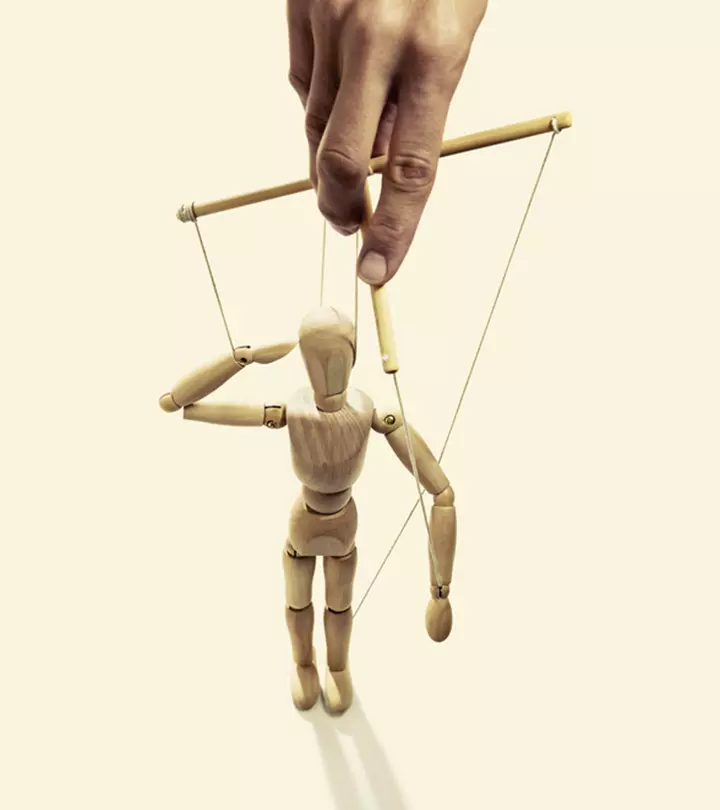7 Different Types Of Liars And How To Deal With Them
It may be hard to believe, but some liars are innocent and have good intentions.

Image: Shutterstock
Lying helps you escape an uncomfortable situation. But, how well you do in the end will determine which type of liar you are. We all lie at some point in our lives, no matter who we are. Lies are a part of life, no matter how we treat them. Liars come in all shapes and sizes. Some are guilty of the occasional innocent fibbing, while others are compulsively deceitful and manipulative. Research shows that people in serious relationships lie less often than those in casual relationships (1). This shows that although the frequency of lying may differ from person to person, most people do lie. Lies, whether trivial white lies or deceptive lies, are painful and can harm relationships deeply. Therefore, identifying the different types of liars and the characteristics of lies is crucial for developing healthy relationships. It allows people to have truthful interactions and safeguard themselves from potential deceit.
Analyzing body language is absolutely helpful to reveal liars. Everyone can tell a lie from time to time but the problem arises when people make it a habit by transforming their attitudes and behaviors towards everyone. In the end, this will badly affect any relationship by destroying the mutual trust created over time. Consequently, it also becomes more and more difficult for people marked as liars to demonstrate their sincerity when facts give them a reason. In the end, lies give no real advantages to anyone. In this article, we dig deeper into the inner world of liars to be able to identify them and attempt to have healthier relationships with them. While the tips given here are based on expert opinions and experiences, they are not absolute as many factors are at work when it comes to human behavior. You need to use your sense of judgment when analyzing why a person is being dishonest with you. Let us now continue exploring some known psychological reasons for lying. Check them out below.
In This Article
What Is Lying?

It may be an exaggeration to state that lying is the biggest art of deception. However, sometimes, people use certain ways of telling the truth that may not be completely truthful. When people lie, there may be a level of self-protection that is involved. These moments can often educate you about a person’s true character.
A person who chooses to tell the truth even though it would not protect their interests is a human with great character. Lying is often dangerous on its own, but if the person lies and gets caught, the outcome may be even more embarrassing and humiliating than the truth.

But, if one can get away with it, should they lie?
Key Takeaways
- Compulsive liars, pathological liars, and white liars are some of the different kinds of liars.
- Liars tell you fictional stories to either get out of a sticky situation,
- The best way to deal with liars is to firmly but politely confront them and tell them that you know the truth.
The Definition Of A Lie

A lie is “an intentionally false statement” that is stated by a person. There are a lot of things involved in this. Obviously, there are different kinds of lies people generally tell. There is a difference between falsely bragging about playing the piano and claiming to be a messenger of God. This is because the person claiming to be godly will cause unnecessary distress to more people when compared to the other case.
The statement that all liars are the same is not true. There are different kinds of lying disorders or personalities. For some people, compulsive lying could be a symptom of a personality disorder. In scientific terms, it is known as pathological lying or mythomania (2). Those who falsely brag about themselves may not be embellishers, but they may be dealing with narcissistic personality disorder or low self-esteem. And then, there are pathetic liars, who lie to people to extract a pathos response.
 Trivia
TriviaWhen someone lies, it becomes evident as their body language changes. There are also other ways you can tell if someone is lying. Let us check out what signs to look out for to identify lies.
Signs Someone Is Lying
It is important to notice and identify the signs that a liar unconsciously shows when lying. This awareness will help you address someone’s dishonesty effectively and stop being manipulated. The common signs of lying are.
- Inconsistent Stories And Details: If you notice that someone is changing their stories and giving conflicting information, know that they have lied to you from the beginning and they don’t remember what they have said before.
- Vague Responses: Whenever you have something to ask of them, they will not give you a straight and convincing reply. Their responses lack conviction. Unclear answers and evasive replies tell you that they are not being completely honest with you.
- Change In Body Language: Research claims that analyzing the face or the body language of people may also help reveal liars (4). If you notice that they are unable to keep eye contact or are constantly swaying their arms and fidgeting with their fingers, know they are mentally building up a convincing lie.
- Over Defensiveness: Liars are vulnerable, and they become overly defensive when countered.
- Frequent Justification: Liars may try to justify their lies with several other lies. Even when you don’t ask or counter, they will try to convince you. This shows they want you to believe their cooked-up story anyhow.
Now that we have learned about the common signs of lying, it is time to explore the different types of liars in detail. Read on.
Different Types Of Liars
The different kinds of liars include compulsive liars, pathological liars, and sociopaths. There are also people who are occasional liars. These people usually tell white lies, which are essentially meaningless and do not result in any harm.
1. Compulsive Liars

Compulsive liars lie because of several reasons. However, you can always find out if they are lying. Their stories don’t usually add up. They are also very obvious and display classic lying behaviors, such as avoiding eye contact, breaking out into a sweat, turning pale, and tripping over their words or rambling (5).
There are two kinds of compulsive liars – narcissistic liars and habitual liars. Narcissistic liars usually have a narcissistic personality disorder. These people usually make up grand stories centered around themselves. They are also prone to embellishment. Narcissistic liars always make themselves out to be the conquering heroes, no matter what the situation is (6). Most of the stories they narrate seem a bit far-fetched or are downright unbelievable.
On the other hand, habitual liars constantly lie, practically all the time. For them, falsehood has become a regular habit, and they see no harm in doing so.
For example, a narcissistic liar might claim they were the keynote speaker at a major international conference when, in reality, they merely attended the event. They may embellish details, describing standing ovations and personal congratulations from renowned figures, even though none of it happened.
On the other hand, a habitual liar could lie about minor, inconsequential things, like saying they had coffee in the morning or claiming they took a different route to work when they did not. These lies often serve no purpose but are told out of habit.
2. Pathological Liars

Pathological liars lie as a response to any stimuli (7). These people are excellent liars because they lie constantly and make up stories so unnecessarily and often that it becomes extremely difficult to distinguish the truth from mendacity. Unlike the compulsive liar, pathological liars are near impossible to catch in the act of prevarication. Pathological lying is also known as pseudologia fantastica.
Dave Fernandez, a blogger about his life experiences, notes that “A pathological liar is a person who lies compulsively and without clear motive. This is very different with a non-pathological liar, whereas the lie is very beneficial and maybe less harmful (i).”
Pathological liars know how to play the eye contact game – when lying, instead of looking away, they fix their gaze upon you. These types of liars use their pathological lying trait as a defense mechanism.
It could be that they lie to avoid something traumatic that happened in their lives, such as abuse. They use lies to protect themselves when a situation goes bad. Of course, no matter what, there is no excuse for lying, but it sure does make it easier to understand why some good people choose to lie.
If you are aware that a pathological liar is spinning a tale, it is important to call them out on it. But make sure you do this in a non-aggressive way so that person doesn’t feel embarrassed or threatened.
For instance, a pathological liar might tell a group of coworkers that they were scouted by a professional sports team in college, even though they never played sports. When questioned, they might double down on the lie by creating elaborate details about fake matches, teammates, and coaches, weaving a story that sounds convincing but is completely fabricated.
When confronted gently, such as saying, “That’s interesting, can you share more details about the team?” they might become evasive or create more intricate lies to avoid exposure. Their ability to maintain eye contact and deliver the story confidently makes it hard to detect the falsehood.
 Trivia
Trivia3. Sociopathic Liars

These types of liars can be very difficult to deal with. Sociopathic liars lack empathy. They do not care if the lies they state impact others negatively or even actively cause harm. This type of liar can be narcissistic and super charming, but this isn’t always true.
Sociopaths are master manipulators. They tell you fictional stories to get you to do what they want, whenever they want it. You are nothing but putty in their hands because they are not capable of feeling sorry for you. Being the target of a sociopath will likely feel horrible because it will conflict with your morals and your sense of right and wrong. A sociopath will continue to manipulate you and get you to see things his or her way until you give them what they want. Therefore, recognizing the signs of manipulation is important to protect yourself from their influence.
As we already mentioned, sociopaths do not feel any empathy. But they are excellent actors. So, if you tell a sociopathic liar that you are not comfortable with something, they will likely not care but will surely act as if they do. They are extremely dangerous and can wreck your peace and mental balance as you spend more and more time with them.
For example, a sociopathic liar might fabricate a story about being in dire financial trouble to manipulate someone into lending them money. They might claim they need it for a medical emergency or to help a family member in distress, pulling at heartstrings with fake details and an emotional performance.
Even if the other person expresses discomfort or hesitancy, the sociopath will persist, acting concerned and apologetic while continuing to pressure them until they give in. Once they have achieved their goal, they show no remorse for the harm caused or the trust betrayed, often moving on to their next target without a second thought.
4. White Liars

We often assume that white lies are not really lies. People who always tell little white lies here and there often feel that they are harmless or even beneficial.
White liars often mix the truth with the lies. They do it so that when people catch them, they tend to believe that they didn’t mean to deceive and were probably confused themselves. However, sometimes, a person may tell white lies when trying to protect someone from the truth if it is too hurtful or damaging.
For instance, a white liar might compliment a friend’s new haircut, saying, “It looks amazing on you!” even if they do not think it suits them. They justify this by believing it is kinder to boost the friend’s confidence rather than risk hurting their feelings with the truth.
In some cases, they might mix truth with the lie, such as saying, “The style really brings out your features,” focusing on a positive aspect while avoiding outright honesty about their overall opinion. This type of lie is usually intended to spare someone’s feelings or avoid unnecessary conflict.
5. Careless Liars

Careless liars are one of a kind. They lie all the time and don’t care much about morals and ethics. Most careless liars are aware of their dishonesty as they don’t put in much thought behind the lies and are generally very sloppy.
If you know a careless liar, it may be a good idea to confront them about their untruthfulness. It is most likely that they are aware of what exactly they are doing. But, at the same time, it does not mean that they will change themselves or even admit it. Be prepared to walk away from people like this, or it may cause you a lot of stress and heartbreak.
A careless liar might tell their friends they have already submitted a group project, even though they have not started working on it. When questioned about it, they might shrug and come up with a vague excuse like, “I got distracted but meant to do it.”
Their lies are often inconsistent and easily disproved, as they do not put much effort into covering their tracks. Confronting them may lead to defensiveness or indifference as they are usually unapologetic about their dishonesty.
6. Occasional Liars

Most people tell a lie occasionally, although it is not something to be applauded or accepted. One of the relatively better things about occasional liars is that this is not a regular thing.
The sweet thing is, they usually feel so guilty about it that they admit their lies and ask for forgiveness. Most of the time, if you call out an occasional liar on their lies, they will be genuinely sorry and want to work on it and change.
For example, an occasional liar might tell their boss they are late to work because of heavy traffic when, in reality, they overslept. They feel guilty about it and later admit the truth, saying, “I’m sorry, I overslept and should have been honest about it.”
If confronted, they are likely to apologize sincerely and make an effort to avoid lying in the future, as their dishonesty is not habitual and stems more from a moment of poor judgment than a deeper pattern.
7. Impulsive Liars

Impulsive liars are the storytellers of the moment, weaving tales on the fly without much premeditation. Unlike compulsive liars, their lies are more reactive and might not be as ingrained in their behavior. Their falsehoods can range from harmless exaggerations to more significant untruths. Impulsive liars might lie without a well-defined purpose; sometimes to avoid embarrassment, enhance a story, or escape consequences. While their lies might not have malicious intent, this behavior can strain relationships and erode trust. Thus, it is important to understand and recognize the source of the impulsiveness to address the core issue and build trust and transparent communication in relationships.
An impulsive liar might claim they have read a popular book during a conversation, even though they have not. This lie is not premeditated; it arises in the moment to avoid feeling left out or embarrassed.
Later, when someone asks them detailed questions about the book, they struggle to maintain the falsehood and might hastily change the subject or admit they have not read it after all. While not malicious, this behavior can create misunderstandings and weaken trust over time.
Let’s now understand how to deal with liars.
How To Deal With Liars

There are many different ways of dealing with liars. The best thing you can do is not react aggressively or with anger – although this is easier said than done and is incredibly difficult.
The liar is expecting an explosive reaction from you anyway and will use this as a diversion and turn the entire situation against you. Be aware that their version of events is likely false. The best way to deal with liars is to firmly but politely confront them and assert that you are aware of the truth and won’t stand their insincerity. Set clear boundaries regarding honesty for your future interactions. Use ‘I’ statements to express how their consistent lies affect you mentally and that they break your trust. This way you can motivate them to engage in open and honest conversations with you in the future and build a deeper emotional connection. However, if you see that the person has no good intentions, get out of the toxic situation.
If you find out that someone has told what they call a ‘white lie, and the lie doesn’t really harm anyone, it is probably best to let it go. You may hint it to the person that you are aware of the truth and are letting it go this one time, else this may become a habit. Always letting go of white lies can cause issues with trust and intimacy, so you need to deal with it.
Tips To Deal With Different Types Of Liars

Dealing with someone who lies can be emotionally draining, especially when it disrupts trust in a relationship. Whether the dishonesty stems from insecurity or deeper behavioral issues, addressing it constructively can help rebuild emotional bonds. Here are practical tips to deal with different kinds of liars.
- Understand The Root Of The Lies
Lying often originates from deeper issues like fear of rejection or past trauma. To address this, create a safe environment where the person feels comfortable opening up. Ask empathetic questions, such as, “Why do you feel the need to hide the truth?” Showing genuine concern can deepen trust.
- Communicate Openly And Honestly
Set the tone for transparency in your relationship by being open about your feelings. Express how dishonesty affects you without being accusatory. For example, say, “It hurts when I sense dishonesty because I value trust in our relationship.” This approach emphasizes your commitment to the relationship rather than placing blame.
- Encourage Self-Reflection
Sometimes, liars are unaware of the impact of their behavior. Encourage them to reflect on how dishonesty affects their relationships and their emotional well-being. This could involve suggesting activities like journaling or seeking therapy to uncover underlying issues.
- Practice Empathy And Patience
Dealing with liars can be frustrating, especially if you do not see change despite repeating yourself, but patience and empathy are key to understanding their behavior. Instead of reacting with anger, try to understand their perspective. Ask yourself, “What might they be afraid of losing by telling the truth?” Compassion can help diffuse tension and open the door to honest communication.
- Seek Professional Help If Necessary
If lying becomes a persistent issue, irrespective of whether it is you or your partner who is lying, that damages your relationship, consider seeking help from a counselor or therapist. A professional can mediate conversations, provide insights into behavioral patterns, and offer tools for nurturing emotional connection and trust.
- Establish Clear Boundaries
Boundaries are essential for fostering a healthy emotional connection. Let the person know that honesty is a non-negotiable element of your relationship. Clearly articulate what you expect and the consequences of continued dishonesty, such as a potential strain or distance in the relationship.
- Focus On Your Emotional Well-being
While working on the relationship, prioritize your mental and emotional health. Practice self-care through activities that bring you joy and peace, such as meditation, exercise, or spending time with supportive friends. A healthy emotional state equips you to approach the situation with clarity.
- Know When To Walk Away
In some cases, repeated dishonesty may indicate a deeper incompatibility. If the person shows no willingness to change or take accountability, it might be time to reassess the relationship. Ending it could be the healthiest choice for your emotional well-being and future relationships.
Dealing with a liar of any kind is challenging but not impossible. It requires empathy and a commitment to rebuilding trust. By addressing dishonesty constructively and focusing on mutual growth, you can create a healthier, more transparent relationship, or make peace with the decision to move on.
Infographic: Top 6 Types Of Liars You Might Come Across
People lie for many reasons. Some lie to cover small mishaps, others lie to manipulate, and yet others lie compulsively. There are 6 different types of liars you should know about and look out for. Check out the infographic below to read more about them! Illustration: StyleCraze Design Team
Lying is a compulsive act, and it is hard for a liar to change this dangerous attitude, no matter how you treat them. We are sure that you will spot these liars without any hassle with the above discussion. Whether you are dealing with a pathological liar, a sociopathic liar, a white liar, a careless liar, or even an occasional one, the point is to identify them and keep a safe distance from them. Honesty is the foundation of any relationship, and it helps build trust. So, if you identify a liar, address their lies first-hand to create meaningful connections without deceit. Make sure you are thorough with the traits of the different types of liars to protect yourself from financial loss, physical harm, or emotional damage.
Frequently Asked Questions
What is the one thing all liars have in common?
Liars avoid confronting facts and tend to hide their feelings. Most liars also tend to be insecure, manipulative, or distrustful.
How do you spot a serial liar?
Pathological liars tend to portray themselves as the star or victim of their lies, being overly detailed or vague about facts or telling lies that have no clear benefit to themselves.
Is lying a mental illness?
Lying is not a mental illness, but it can be a symptom of certain mental health conditions, such as personality disorders or compulsive behavior disorders.
Why are liars toxic?
Liars can be toxic because they can damage trust and relationships, cause emotional distress and harm, and engage in emotional manipulation, which undermines the integrity of social interactions and institutions.
Is lying part of psychology?
Lying is a common subject in the study of psychology because it is a complex behavior with many different factors that can influence it, such as social norms, personality traits, and cognitive processes.
Is lying a bipolar disorder?
Lying is not a symptom of bipolar disorder specifically, but people with bipolar disorder may experience impulsivity or manic episodes that can lead to impulsive or reckless behavior, including lying.
What is a fraudster?
A fraudster is someone who engages in fraudulent activities with the intention of deceiving and profiting from their victims, such as financial scams or identity theft.
Discover the different types of liars and how to spot them. Learn how to identify a liar and protect yourself from being deceived easily. So, click on the video below to bookmark helpful tips on spotting a liar.
Personal Experience: Source
StyleCraze's articles are interwoven with authentic personal narratives that provide depth and resonance to our content. Below are the sources of the personal accounts referenced in this article.
i. Pathological Liarhttps://thewriterdave92.wordpress.com/
References
Articles on StyleCraze are backed by verified information from peer-reviewed and academic research papers, reputed organizations, research institutions, and medical associations to ensure accuracy and relevance. Read our editorial policy to learn more.
- Lie prevalence, lie characteristics and strategies of self-reported good liars
https://pmc.ncbi.nlm.nih.gov/articles/PMC6890208/ - Pseudologia Fantastica
https://www.ncbi.nlm.nih.gov/books/NBK606104/ - The Phenomenology of Lying in Young Adults and Relationships with Personality and Cognition
https://pmc.ncbi.nlm.nih.gov/articles/PMC6542652/ - Catching a Liar Through Facial Expression of Fear
https://pmc.ncbi.nlm.nih.gov/articles/PMC8217652/ - A WORLD OF LIES
https://pmc.ncbi.nlm.nih.gov/articles/PMC2957901/ - The relations between deception, narcissism and self-assessed lie- and truth-related abilities
https://pmc.ncbi.nlm.nih.gov/articles/PMC8009107/ - Pathological Lying: Theoretical and Empirical Support for a Diagnostic Entity
https://pmc.ncbi.nlm.nih.gov/articles/PMC9176035/
Read full bio of Rodolfo Parlati
Read full bio of Sneha Tete
Read full bio of Asmita De
Read full bio of Sangita Goel



























Community Experiences
Join the conversation and become a part of our empowering community! Share your stories, experiences, and insights to connect with other beauty, lifestyle, and health enthusiasts.